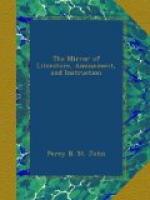How the encouragement which she received operated may be seen in some lines, not otherwise worthy of preservation than for the purpose of showing how the promises of reward affect a mind like hers. They were written in her thirteenth year.
Whene’er the muse pleases to grace
my dull page,
At the sight of reward, she flies
off in a rage;
Prayers, threats, and intreaties I frequently
try,
But she leaves me to scribble, to fret,
and to sigh
She torments me each moment, and bids
me go write,
And when I obey her she laughs at the
sight;
The rhyme will not jingle, the verse has
no sense,
And against all her insults I have no
defence.
I advise all my friends who wish me to
write,
To keep their rewards and their gifts
from my sight,
So that jealous Miss Muse won’t
be wounded in pride,
Nor Pegasus rear till I’ve taken
my ride.
Let not the hasty reader conclude from these rhymes that Lucretia was only what any child of early cleverness might be made by forcing and injudicious admiration. In our own language, except in the cases of Chatterton and Kirke White, we can call to mind no instance of so early, so ardent, and so fatal a pursuit of intellectual advancement.
“She composed with great rapidity; as fast as most persons usually copy. There are several instances of four or five pieces on different subjects, and containing three or four stanzas each, written on the same day. Her thoughts flowed so rapidly, that she often expressed the wish that she had two pair of hands, that she might employ them to transcribe. When ‘in the vein,’ she would write standing, and be wholly abstracted from the company present and their conversation. But if composing a piece of some length, she wished to be entirely alone; she shut herself into her room, darkened the windows, and




